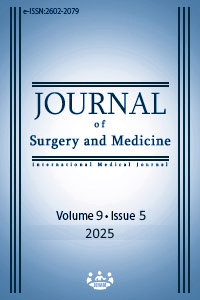Gender-related differences in survival in locally advanced luminal A breast cancer patients
Gender difference on luminal a breast cancer
Keywords:
breast cancer, Luminal A, hormone positive, survivalAbstract
Background/Aim: Breast cancer is known to exhibit variations in clinical outcomes based on several factors, including molecular subtypes and patient demographics, yet the influence of gender on survival outcomes in patients with locally advanced stage luminal A breast cancer remains underexplored. This study aimed to determine how gender affects the survival of patients with locally advanced stage breast cancer.
Methods: Data were obtained from the Surveillance Epidemiology and End Results (SEER) database. Patients with luminal A molecular subtype and locally advanced stage breast cancer who had been diagnosed between 2010 and 2019 were included in the study. Age, gender, marital status, race, and year of diagnosis were classified as clinical data, and tumor localization, laterality, grade, stage, surgical status, radiotherapy and chemotherapy status, cause of death, and survival time were classified as oncological data. Data were compared based on gender.
Results: The study included a total of 46,730 patients. A very small percentage of the patients were male (1.2%), while 98.8% were female. Male patients were significantly older and had a higher marriage rate. Racial distribution differed slightly with more black patients among the males. Grade 2 tumors were most prevalent in both genders, but males had higher grade 3 tumors. Stage 3B and 3C tumors were more common in males, but no significant difference for Stage 3C based on gender was detected. Surgical rates were similar between genders, while females had higher rates of treatment with radiotherapy and chemotherapy. Females exhibited significantly higher overall survival rates (64.4% versus 52.2%). Cancer-specific survival did not differ significantly (76.3% versus 72.1%). Males had a 1.6 times higher overall mortality risk, which was reduced to 1.3 times after adjusting for other prognostic factors.
Conclusion: No difference in cancer-specific survival between men and women with locally progressed luminal A breast cancer was found. These results highlight the significance of considering gender-specific characteristics while managing patients and predicting their prognosis. To fully understand the underlying mechanisms behind the survival differences between male and female patients, further studies are required.
Downloads
References
Yersal O, Barutca S. Biological subtypes of breast cancer: Prognostic and therapeutic implications. World J Clin Oncol. 2014;5(3):412-24. doi: 10.5306/wjco.v5.i3.412.
Testa U, Castelli G, Pelosi E. Breast Cancer: A Molecularly Heterogenous Disease Needing Subtype-Specific Treatments. Med Sci (Basel). 2020;8(1):18. doi: 10.3390/medsci8010018.
Scomersi S, Giudici F, Cacciatore G, Losurdo P, Fracon S, Cortinovis S, et al. Comparison between male and female breast cancer survival using propensity score matching analysis. Sci Rep. 2021;11(1):11639. doi: 10.1038/s41598-021-91131-4.
Feng Y, Spezia M, Huang S, Yuan C, Zeng Z, Zhang L, et al. Breast cancer development and progression: Risk factors, cancer stem cells, signaling pathways, genomics, and molecular pathogenesis. Genes Dis. 2018;5(2):77-106. doi: 10.1016/j.gendis.2018.05.001.
Foerster R, Foerster FG, Wulff V, Schubotz B, Baaske D, Wolfgarten M, et al. Matched-pair analysis of patients with female and male breast cancer: a comparative analysis. BMC Cancer. 2011;11:335. doi: 10.1186/1471-2407-11-335.
Yalaza M, İnan A, Bozer M. Male Breast Cancer. J Breast Health. 2016 Jan 1;12(1):1-8. doi: 10.5152/tjbh.2015.2711.
Gnerlich JL, Deshpande AD, Jeffe DB, Seelam S, Kimbuende E, Margenthaler JA. Poorer survival outcomes for male breast cancer compared with female breast cancer may be attributable to in-stage migration. Ann Surg Oncol. 2011;18(7):1837-44. doi: 10.1245/s10434-010-1468-3.
Aizer AA, Chen MH, McCarthy EP, Mendu ML, Koo S, Wilhite TJ, et al. Marital status and survival in patients with cancer. J Clin Oncol. 2013;31(31):3869-76. doi: 10.1200/JCO.2013.49.6489.
Yao N, Shi W, Liu T, Siyin ST, Wang W, Duan N, et al. Clinicopathologic characteristics and prognosis for male breast cancer compared to female breast cancer. Sci Rep. 2022;12(1):220. doi: 10.1038/s41598-021-04342-0.
Anderson WF, Jatoi I, Tse J, Rosenberg PS. Male breast cancer: a population-based comparison with female breast cancer. J Clin Oncol. 2010;28(2):232-9. doi: 10.1200/JCO.2009.23.8162.
Łukasiewicz S, Czeczelewski M, Forma A, Baj J, Sitarz R, Stanisławek A. Breast Cancer-Epidemiology, Risk Factors, Classification, Prognostic Markers, and Current Treatment Strategies-An Updated Review. Cancers (Basel). 2021;13(17):4287. doi: 10.3390/cancers13174287
Gucalp A, Traina TA, Eisner JR, Parker JS, Selitsky SR, Park BH, et al. Male breast cancer: a disease distinct from female breast cancer. Breast Cancer Res Treat. 2019;173(1):37-48. doi: 10.1007/s10549-018-4921-9.
Macdonald G, Paltiel C, Olivotto IA, Tyldesley S. A comparative analysis of radiotherapy use and patient outcome in males and females with breast cancer. Annals of oncology. 2005;16(9):1442-8. doi: 10.1093/annonc/mdi274
Liu N, Johnson KJ, Ma CX. Male Breast Cancer: An Updated Surveillance, Epidemiology, and End Results Data Analysis. Clin Breast Cancer. 2018;18(5):e997-e1002. doi: 10.1016/j.clbc.2018.06.013.
Wang K, Wang QJ, Xiong YF, Shi Y, Yang WJ, Zhang X, et al. Survival Comparisons Between Early Male and Female Breast Cancer Patients. Sci Rep. 2018;8(1):8900. doi: 10.1038/s41598-018-26199-6.
Liu L, Chi YY, Wang AA, Luo Y. Marital Status and Survival of Patients with Hormone Receptor-Positive Male Breast Cancer: A Surveillance, Epidemiology, and End Results (SEER) Population-Based Study. Med Sci Monit. 2018;24:3425-3441. doi: 10.12659/MSM.910811.
Yedjou CG, Sims JN, Miele L, Noubissi F, Lowe L, Fonseca DD, et al. Health and Racial Disparity in Breast Cancer. Adv Exp Med Biol. 2019;1152:31-49. doi: 10.1007/978-3-030-20301-6_3.
Downloads
- 489 733
Published
Issue
Section
How to Cite
License
Copyright (c) 2025 Ahmet Necati Sanli
This work is licensed under a Creative Commons Attribution-NonCommercial-NoDerivatives 4.0 International License.
















